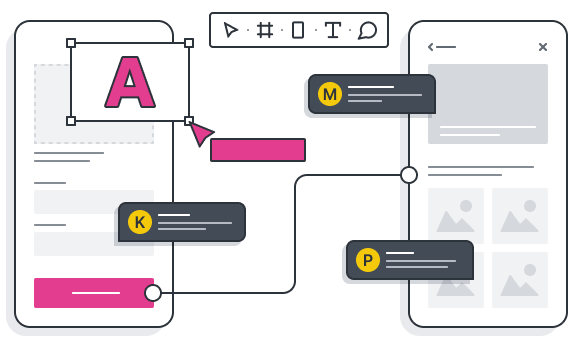He recently spoke to us about the increased demand for UX services in light of Covid-19 and the unique challenges now faced by professionals, both in agencies and in-house teams.
This piece was created as part of the report; Covid-19: What can we expect?
How has your business changed over the past few weeks?
Initially, we saw some skepticism about whether or not we could maintain the level of highly-integrated collaboration needed to do UX. Clients were anxious about that; partly because they didn’t have experience using the tools themselves and partly because they’d not seen it done remotely before. However, once they tried it they realised not only was it possible to collaborate remotely, in some cases, it was favourable.
What will the UX industry look like beyond lockdown?
As I look back over my career, two big financial shocks have led to a growth in user experience: the dot-com crash and the financial crash. These crises meant that people who were blindly investing in digital stopped and were much more critical about business plans. Working in a digital agency at the time, I saw the overall team shrink. But my team grew during that period because we had the case studies. We could prove that the interventions we were doing led to an improvement in outcomes and a return on investment.
These crashes actually made people think about what you needed to do to deliver good work which led to an expansion in the market. It led to companies saying, “We need to invest in our digital channels because they are the lowest cost-to-serve channels.” It led to the government in the UK saying, “We need to reduce the cost of delivery, therefore, we will deliver digitally.”
Now, because of Coronavirus the global economy is once again heading into a really difficult time and it’s only going to accelerate the need for digital transformation.
There will absolutely be a far greater need for digital services and therefore the digital skills that provide those services. The pressure will be to deliver services at scale to businesses that have been through a big financial shock. It’s hard to predict the specifics of what that will look like. It might be enhanced teams where companies have their own UX capabilities or outsourced services.
What are the benefits of outsourcing services rather than building in-house teams right now?
I think what you get from an in-house team is good business as usual. But from what I’ve observed, even organisations which have a great pressure to transform, can struggle to create that transformation without some kind of external agent to support it.
Agencies can bypass a lot of the layers of process in a business – they can connect the dots across organisations and communicate freely up and down the ladder. And that’s what you need when you want to make innovation and change happen.
I think the nature of this change is so shocking, so sudden, so deep, that agencies and consultancies will need to rethink their services to fit the new demands of clients and organisations. I think the need to deliver at pace is going to be heightened, and delivering at pace while guaranteeing results will be the challenge.
What do the new ways of working look like for UX practitioners? Are there new skills that they will need?
I think that UX always sits at the crossroads of different disciplines whether you’re in an agency, consultancy or in-house UX team. Often, one of the dangers of an external UX team is that they’re so narrowly focused on getting the UX right, they’re not looking at how it would then be implemented. The design might be great but does it integrate with the tech or the internal processes? UX needs to be done in a genuinely collaborative cross-functional way. It’s the only way to deliver successful change.
UX designers need to empathise with the technical architects of the product, as much as the end user. If they don’t have that skill, they need to learn it quickly.
How do you develop greater empathy for other teams?
By spending time with them and trying to understand what their lives are like. Only when you work alongside the IT team can you get a sense of the difficulties and frustrations they might be facing. That’s really important. Same goes for marketing or operations – once you understand what it’s like to try and run these functions, you understand why you get certain feedback or resistance. You have to go out and engage and listen.
What advice would you offer UX professionals at this time?
I think the advice I’d give anybody in this field is that you need to apply the same skills and thinking to yourself, that you’re telling other people to apply to their user experience.
You need to develop empathy with the departments with whom you collaborate. And the people who are buying your services in this new climate. Focus on the outcomes. Instead of talking about the value of user experience, show them that you’ve listened to them. Show them you understand the desired outcome for the business and you know how to get there.
An even greater skill again is helping stakeholders to unravel what outcomes they may want or
have. Helping people define the problem that they are trying to solve in clear and unambiguous terms. That’s really what UX professionals need to excel in this post-Covid industry.
Are there any changes that you’ve made in your work or business that you plan to continue?
One of the things that has been really helpful for us is engaging digitally with our clients. It’s made it easy for us to do things like online seminars with international teams. I think that type of change, being able to bring together teams that are geographically dispersed is going to stay.





